University of Lisbon student visit PML for individual training
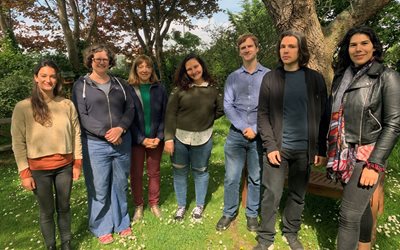 Three students have visited PML in May as part of their PhD, to share knowledge and capabilities. Giulia Sent is working with PML's Tom Jackson on the bioptical properties of estuaries. Filipa Afonso aims to create a sustainable management plan for Sado Estuary (Portugal), based on a Natural Capital Approach. As part of the project, stakeholders will be asked to participate in a workshop to capture the local needs and their recommendations for the management plan. Filipa is working directly with Stefanie Broszeit, her PhD supervisor, to create and structure the methodology which will be used to perform the stakeholder meetings. Silvia Almeida is working with Aser Mata on a field campaign aiming to assess the feasibility of monitoring Pacific Oysters using drone images, taken at low altitudes, and Machine Learning. She will be working closely with PML to publish the results of the models and the data collected will be used in the upcoming PORTWIMS training course.
Three students have visited PML in May as part of their PhD, to share knowledge and capabilities. Giulia Sent is working with PML's Tom Jackson on the bioptical properties of estuaries. Filipa Afonso aims to create a sustainable management plan for Sado Estuary (Portugal), based on a Natural Capital Approach. As part of the project, stakeholders will be asked to participate in a workshop to capture the local needs and their recommendations for the management plan. Filipa is working directly with Stefanie Broszeit, her PhD supervisor, to create and structure the methodology which will be used to perform the stakeholder meetings. Silvia Almeida is working with Aser Mata on a field campaign aiming to assess the feasibility of monitoring Pacific Oysters using drone images, taken at low altitudes, and Machine Learning. She will be working closely with PML to publish the results of the models and the data collected will be used in the upcoming PORTWIMS training course.
Trainers and students at PML - from left to right:
Giulia Sent, Stefanie Broszeit, Vanda Brotas, Filipa Afonso,
Tom Jackson, Aser Mata and Silvia Almeida.
Ecosystem services workshop participants
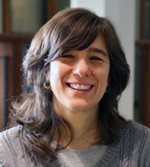 Alexandra Marçal Correia
Alexandra Marçal Correia
My participation in the PORTWIMS Workshop on ecosystem services and natural capital, Lisbon, Portugal was an exciting experience, providing new perspectives to both Ecosystem Services and Natural Capital approaches. It also gave me an opportunity to increase network involving colleagues from the same field but with different competencies. Particularly, this workshop allowed us to establish a basis for future collaborative work in conceptual models with Melanie and Stephanie, from Plymouth Marine Laboratory."
Sara Cabral
PORTWIMS gave me the opportunity to participate in the workshop on ecosystem services and natural capital held at the University of Lisbon and provided by the Plymouth Marine Laboratory (PML). Since my main research work focuses marine invertebrates, particularly commercial bivalve species (such as cockles, clams, oysters and mussels) I was very interested in deepening my knowledge on ecosystem services in general and apply this expertise to my specific research. Therefore, I was able to prepare a case-study based upon an undergoing project focusing the manila clam at the Tagus estuary and with the support of both Mel Austen and Stephanie Broszeit (from PML) the ecosystems services provided by this species were identified and analysed. This practical approach used during the entire workshop was essential not only to understand the importance of this subject, but also to know how to apply and interpret the results. Moreover, I find this cultural and knowledge interexchange between researchers from different countries very interesting and might also enhance future collaborations.
Staff exchange to aid plankton studies
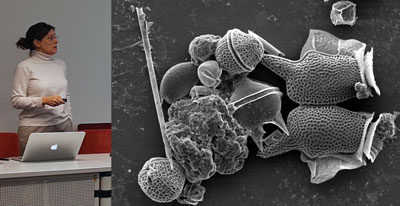 Ana Amorim and Rita Zilhão from the University of Lisbon visited the Alfred-Wegener Institut (AWI) in February 2020 to gain insight into the use of environmental DNA in phytoplankton studies and how this may be combined with the more classical approach of morphological based taxonomy.
Ana Amorim and Rita Zilhão from the University of Lisbon visited the Alfred-Wegener Institut (AWI) in February 2020 to gain insight into the use of environmental DNA in phytoplankton studies and how this may be combined with the more classical approach of morphological based taxonomy.
They were hosted by Alexandra Kraberg, Katja Metfies and Stephan Wietkamp and the collaboration included detailed analyses of phytoplankton samples using Scanning Electron Microscopy (SEM). The team plan to publish an atlas of phytoplankton from Portuguese coastal waters and future staff exchanges are also planned so researchers from the AWI can visit Lisbon University.
Image: Ana Amorim (left) presenting to AWI team, SEM image of phytoplankton (right)
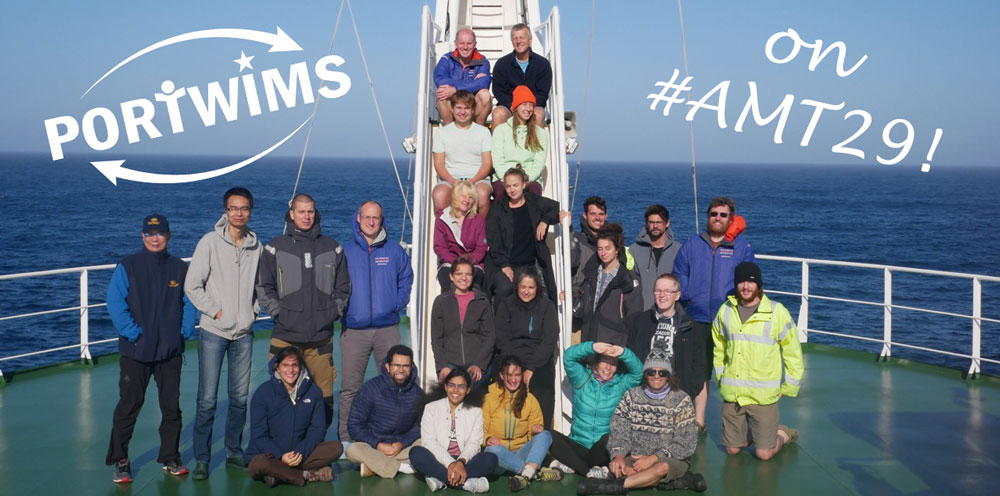
Carolina Sá
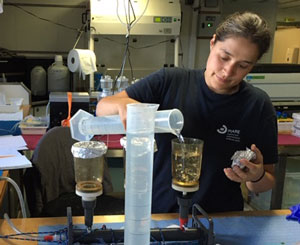 AMT29 is the longest oceanographic campaign I have ever participated and it has been very interesting in many ways.
AMT29 is the longest oceanographic campaign I have ever participated and it has been very interesting in many ways.
Scientifically, it crosses different oceanographic regions which allows us to see in situ the characteristics of the various water masses and the changes occurring along the Atlantic. We have sailed in the North and South Atlantic productive waters, the oligotrophic gyres and crossed the equatorial region. While analysing the water samples we have the chance to observe those variations in the parameters we are measuring, in my case the Particle Size Distribution (PSD), and best of all, to discuss them with the multidisciplinary team onboard by comparing with their observations.
In the beginning of the campaign the Coulter Counter gave us a few headaches, but with the support of all, this was quickly solved, and I was able to make daily PSD measurements of samples collected at two depths during the CTD noon-cast.
During this campaign I had also the chance to contribute for the NASA’s AERONET Maritime aerosol network by taking measurements with a Microtops Sunphotometer sensor during clear skies conditions.
At a personal level, it was also very enriching to share my days with people from several different cultures (more than 10 different nationalities on board!) and understand that the ocean can also contribute to a world with no “walls”.
Guilia Sent
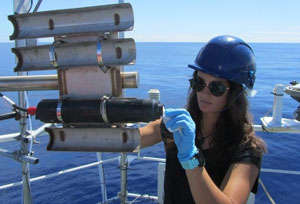 Participating in the Atlantic Meridional Transect has been so far one of the most enriching experiences I have ever had.
Participating in the Atlantic Meridional Transect has been so far one of the most enriching experiences I have ever had.
As a masters student in Marine Science, being in a research vessel across the Atlantic Ocean for more than a month surrounded by experienced scientists has been like a full immersion in everything I’ve been studying in books. A team of 20 scientists from 11 different nationalities were on board the RRS Discovery with the aim of studying the Atlantic ecosystem, being also an unique networking opportunity.
For me, the cruise has been a 24/7 intensive course in different fields (e.g. optics, phytoplankton ecology, oceanography) and I found particularly useful the weekly science meetings, where the various researchers could present and discuss their observations. The complementarity and multi-disciplinarity of the team allowed me to have a broader perspective and understanding of all the oceanographic processes occurring in the Atlantic.
Throughout this experience, I’ve been surrounded by great scientists who were always ready to help me and to give useful advice that will be very beneficial for my work back home. I’m feeling even more motivated to continue my career with a PhD in the field, perhaps with a possible collaboration with them.
Furthermore, at a personal level this experience allowed me to grow under different aspects. I found myself really comfortable with the demanding work schedule at sea, which also motivates me to participate in more oceanographic campaigns in the future. I am really thankful to the PORTWIMS project for giving me the opportunity to take part in this unforgettable experience.
Andreia Tracana
I never thought I would have the opportunity to embark again on this Atlantic expedition, and I am very grateful I have been given this chance as in the first time (AMT28) I was quite nervous and took me a while to adapt to life on board, but now I'm more at ease and enjoying a lot the overall experience, despite the bad weather we have been through.
In this AMT29 I'm responsible for the pH analysis of all water samples collected from the CTD and for filtering plankton samples to study the coccolithophore communities in the framework of DUSTCO project.
The good team spirit and interdisciplinary knowledge of the scientific team results in cooperation and complementarity between some of the projects being conducted on this cruise. Each week there is a scientific meeting where we present what we are doing and discuss preliminary results. As a young researcher, participating in these meetings is helping me to broaden my perspectives and have a better understating of the oceanographic processes occurring in the Atlantic.
This experience is making me grow as a scientist and as a person, I hope to have similar opportunities in the future and for now I will try to make the most of it!
Alice Santos visits PML to learn about valuing ecosystem services
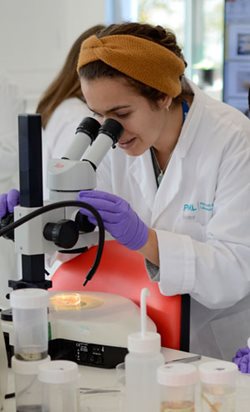 For three weeks, between October and November, I had the opportunity to join Plymouth Marine Laboratory (PML) within the PORTWIMS framework.
For three weeks, between October and November, I had the opportunity to join Plymouth Marine Laboratory (PML) within the PORTWIMS framework.
As a student from Lisbon University, doing my Masters in Ecology and Environmental Management, my dissertation thesis (integrated in the COBIO-NET project) aims to evaluate coastal ecosystem services (ES), particularly those provided by marine invertebrates in mangroves, seagrasses and corals along the coasts of Mozambique and São Tomé and Principe – detecting knowledge gaps and assessing the state, trends and key vulnerabilities, covering interactions with traditional practices.
The focus of this exchange relied on a collaboration with Dr Melanie Austen and Dr Stefanie Broszeit, both involved in the Blue Communities project. In this context, the main purpose of this partnership was to strengthen scientific knowledge and exchange ideas about methodologies of evaluation and quantification on the above-mentioned ES.
The experience of the exchange was extremely positive and successful, since both Dr Austen and Dr Broszeit are very dedicated and approachable, helping me to acquire useful skills and introducing me to new perspectives and approaches for my dissertation. Being so, I was able to make a lot of progress and return home even more enthusiastic and aware of the work I must keep developing.
I also had the opportunity to participate in the ACCORD training course, which had the holistic aim to help partner countries to build a resilient marine and coastal socio-ecological system and support their growing Blue Economies - doing so, I’m very thankful for having attended this course, since it helped me understand how a big project can work, besides giving me the opportunity to learn more than what I was ever expecting.
My stay at PML exceeded my expectations and I am very happy to have the opportunity to keep in touch with my hosts in the future.
Caroline Sá visits Plymouth Marine Laboratory
Last May, in the framework of PORTWIMS, I had the opportunity to work for three weeks at PML under the guidance of Dr. Giorgio Dall’Olmo. The objective was to start working with particle size distribution (PSD) and flow-cytometry data from past AMT campaigns in order to investigate the contribution of phytoplankton to the total particle size distribution throughout the Atlantic Ocean.
Until now I had mostly worked with HPLC pigment datasets for ocean colour applications and product validation focusing on the phytoplankton component (i.e. Chl-a and size-classes) off the Portuguese coast. This exchange program is allowing me to explore other types of data which can be complementary and understand the particle size distribution patterns at a different spatial scale: the Atlantic Ocean basin.
During these three weeks I have specifically analysed PSD data and developed a method to automatically extract the diameters of each identified size class using the Octave programming language. Staying at PML was essential as it permitted discussion of results and progress work on a daily basis as well as to plan and define sampling strategies for the AMT29 campaign.
I had also the chance to participate in the AMT29 preparation workshop and meet the colleagues and projects that will be conducted during the cruise; and I have jumped from a 3m height diving board to get my Sea Survival course diploma, which was required for participating in the campaign!
Overall this has been a great learning experience not only in terms of data processing but also in data analysis, interpretation and experiment planning. The work will now continue remotely until the AMT29 departure on the 13th October, where I will be responsible for making measurements of PSD in order to characterize its horizontal and vertical patterns throughout the Atlantic transect.
Mara Gomes, Polarstern, July 2019
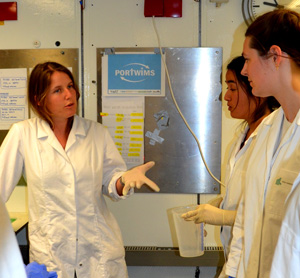 PORTWIMS enabled Mara Gomes from Lisbon University to participate in the Polarstern cruise where she conducted research on radiometric properties for validation and taught the students about phytoplankton. Mara said "the participation of experts in different science and technology fields and curious young scientists made the expedition a life-changing experience".
PORTWIMS enabled Mara Gomes from Lisbon University to participate in the Polarstern cruise where she conducted research on radiometric properties for validation and taught the students about phytoplankton. Mara said "the participation of experts in different science and technology fields and curious young scientists made the expedition a life-changing experience".
On the South North Atlantic Transect (SoNoAT) of R/V Polarstern, Mara was responsible for teaching phytoplankton topics within the biology and microplastics module of the POGO (Partnership for the Observation of the Global Ocean) floating summer school. The focus was to give the opportunity to POGO scholars from all over the world to join a marine sciences expedition providing hands-on onboard research and laboratory training.
In her blog Mara said "The teaching experience on R/V Polarstern has been by far the one from which I learned the most, not only scientifically but from a social perspective. The participation of experts in different science and technology fields and curious young scientists was made this expedition a life-changing experience, both for teachers and students, and especially for me! Motivated by the same need to protect our blue planet, we will never stop exploring the oceans. For further information read Mara's blog post.
First PORTWIMS on-site training of FCUL young staff at AWI
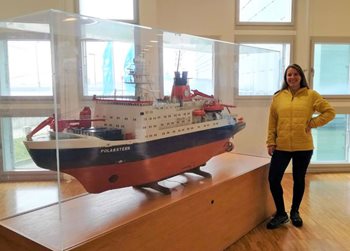 In June 2019 the German RV Polarstern will be crossing the Atlantic Ocean from Port Stanley (Falkland Islands) to Bremerhaven (Germany) as part of the expedition PS120 programme. Within a wide range of research topics that will be covered during this cruise Mara Gomes, a masters student from FCUL, will be studying the ecology and distribution of phytoplankton communities living in different biogeochemical provinces of the Atlantic Ocean.
In June 2019 the German RV Polarstern will be crossing the Atlantic Ocean from Port Stanley (Falkland Islands) to Bremerhaven (Germany) as part of the expedition PS120 programme. Within a wide range of research topics that will be covered during this cruise Mara Gomes, a masters student from FCUL, will be studying the ecology and distribution of phytoplankton communities living in different biogeochemical provinces of the Atlantic Ocean.
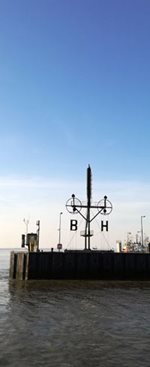 In collaboration with AWI, Mara will be running inline the AWI hyperspectral in situ spectrophotometer (AC-S) instrument to obtain continuous measurements of phytoplankton absorption spectra at the surface ocean along the cruise transect. The data will be further processed and analysed in conjunction with pigment concentration measurements (performed back home in the FCUL lab) when she is back from the cruise in order to derive a high temporally resolved data set on the overall and major phytoplankton groups’ abundance (indicated as chlorophyll concentration) in this ocean surface waters.
In collaboration with AWI, Mara will be running inline the AWI hyperspectral in situ spectrophotometer (AC-S) instrument to obtain continuous measurements of phytoplankton absorption spectra at the surface ocean along the cruise transect. The data will be further processed and analysed in conjunction with pigment concentration measurements (performed back home in the FCUL lab) when she is back from the cruise in order to derive a high temporally resolved data set on the overall and major phytoplankton groups’ abundance (indicated as chlorophyll concentration) in this ocean surface waters.
In order to gain the knowledge to run her measurements successfully, Mara spend one week in February in the Phytooptics Group (lead by Prof. Dr. Astrid Bracher) at AWI. Here she received hands-on training by the group’s technician Sonja Wiegmann on operating and calibrating the AC-S instrument and an introduction by the group’s PhD student Yangyang Liu into python analysis tools to further process the data. The AWI (Phytooptics Group) was happy to host Mara for the training, as she brought the sun from Portugal to northern Germany!
First PORTWIMS exchanges
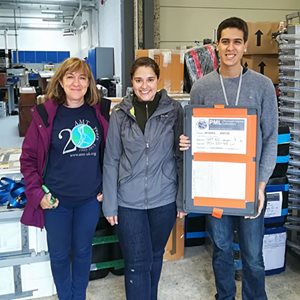 Andreia Tracana and Afonso Ferreira had the 'experience of a lifetime' (Andreia) as the first participants to benefit from a PORTWIMS exchange. They set sail on-board RRS Discovery on the Atlantic Meridonial Transect (AMT) research cruise in September.
Andreia Tracana and Afonso Ferreira had the 'experience of a lifetime' (Andreia) as the first participants to benefit from a PORTWIMS exchange. They set sail on-board RRS Discovery on the Atlantic Meridonial Transect (AMT) research cruise in September.
Afonso Ferreira said:
"AMT28 was a special opportunity all-round. I had the chance to work under two great scientists and professionals in Giorgio Dall'Olmo and Bob Brewin, from the Plymouth Marine Laboratory, who were not only always ready to help me out during work, but also made sure I had everything I needed during the cruise. As my first long research cruise, AMT28 was a challenge at several levels. The long working hours, the unusual work schedule and the fact that you're at sea for over a month can be quite stressful at times. In hindsight, however, I can say that our work was successful and my time during the AMT28 undoubtedly improved my ability to adapt and find a way to overcome difficulties during work. Plus, it was a privilege to be able to integrate such a helpful, large multi-disciplinary and diverse team. All in all, having the opportunity to participate in the AMT28 cruise was unique, and I hope to be fortunate enough to repeat the experience in the future."
Andreia described her experience onboard AMT:
"My participation in AMT28 was the experience of a lifetime. As a marine biologist, going on a oceanographic research cruise across the Atlantic Ocean, from Plymouth to the Falkland Islands, was one of my goals and the high point of my career so far. Being able to work on a ship with a scientific team from different countries and backgrounds inspired me to pursue to a PhD. My tasks aboard the cruise where demanding, but constituted a different and exciting experience. I have learned more than I could have ever expect, both professionally and personally and I’m quite excited to proceed my career with the knowledge obtained during AMT. I’ve also discovered that I’m able to work long hard hours and that I don’t suffer from sea sickness! I hope that more opportunities like this one appear in my path because this experience was indeed enriching in all aspects of my life and seeing icebergs and penguins for the first time was unspeakable, a memory that I will forever keep in my heart."